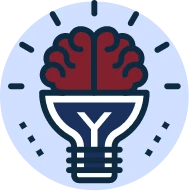Undergraduate Programmes (UG)
Candidates must have secured a minimum of 50% marks in 12th standard (Secondary School Certificate) from State Boards, CBSE, or CISCE (Council for the Indian School Certificate Examinations).
Postgraduate Programmes (PG)
Applicants must hold a bachelor’s degree in any discipline from a university/institution recognised by the UGC or an equivalent body, with a minimum aggregate of 50% marks or an equivalent grade (CGPA/CPI, etc.).
Final-year students may also apply, provided they can submit their final year degree certificate/mark sheet within the stipulated deadline. Admission will remain provisional until valid proof of passing the bachelor’s degree examination with the required percentage is submitted. Failure to do so will result in automatic withdrawal of admission without further notice.
Management Programmes
Candidates must have a valid test score in any of the following national-level entrance exams conducted in the current year:
CAT (conducted by IIMs)
XAT (conducted by XLRI)
MAT
NMAT
CMAT
GMAT (valid for five years—ensure your score remains valid until the enrolment date as per the schedule)
Note: IIMs and XLRI have no role in the selection process or conduct of the programme.
Engineering Programmes
Applicants must hold a B.E./B.Tech. degree in the relevant discipline.
Law Programmes
Candidates must possess an LL.B. degree or an equivalent qualification from a recognised university, with at least 50% marks in aggregate (45% for SC/ST and PWD candidates).
IILM University follows the UGC-mandated refund policy for all undergraduate and postgraduate programs
-full.webp)
At IILM University, the focus is on holistic development and leadership. The law school offers a comprehensive education that blends academics with practical exposure, preparing students to excel in legal, corporate, and social domains.
-full-full.webp)
Delivering quality education with a legacy of three decades.

A strong, supportive alumni community spread across the globe.

Partnering with renowned global institutions for a holistic education experience.

Connecting students with leading employers for rewarding careers.

Eco-friendly campuses situated in prime, accessible locations.

Recognising and rewarding academic excellence with financial support.

Learn from experts with rich academic and industry experience.

Experience an engaging and dynamic environment both inside and outside the classroom.

A curriculum designed to meet global standards of education and practice.

Graduates will have a solid grounding in key legal areas such as constitutional law, criminal law, and civil law, preparing them for entry-level legal roles.

Students will develop effective communication skills for legal writing, advocacy, and argumentation, enabling them to present legal concepts with clarity and confidence.

Graduates will be equipped with ethical decision-making skills and a commitment to uphold justice and fairness in all legal matters.

Students will gain practical experience through internships, legal clinics, and moot court participation, ensuring they can apply theoretical knowledge in real-world settings.

Students will develop the ability to analyse legal issues critically and apply appropriate solutions to real-life legal problems.

Graduates will be prepared to navigate legal systems at the national and international levels, with an understanding of diverse socio-legal contexts.

The BBA programme and its real-world exposure paved my way to the University of Leeds.
BBA 2022

The BBA programme and its real-world exposure paved my way to the University of Leeds.
BBA 2022

The BBA programme and its real-world exposure paved my way to the University of Leeds.
BBA 2022

Graduates will gain in-depth knowledge and expertise in specialised areas of law (e.g., corporate law, international law, human rights), enabling them to lead and innovate in their chosen legal fields.
Postgraduate students will develop advanced research skills, enabling them to critically analyse complex legal issues and contribute to scholarly work in the field of law.
Graduates will develop leadership qualities, preparing them to influence legal policy, practices, and reforms in their respective legal domains and societal contexts.
Students will be encouraged to integrate legal knowledge with insights from other disciplines (e.g., business, technology, and public policy), allowing them to address complex legal challenges in a globalised world.
Completion of 10+2 from a recognised board (India or overseas) with a minimum of 50% aggregate marks.
Business Law & Corporate Governance
Students learn about the legal principles governing business operations, including contract law, business structures, and commercial transactions.
Intellectual Property Rights
Students explore the legal protection of intangible assets, such as patents, trademarks, copyrights, and trade secrets. They delve into intellectual property law, including the process of obtaining and enforcing rights, and its significance in innovation and business strategy.
Alternative Dispute Resolution Framework
Students study methods for resolving conflicts outside traditional litigation, including mediation, arbitration, and negotiation, while exploring the benefits and limitations of each approach.
Information Technology Law
This elective covers legal issues related to technology, including data protection, cybersecurity, intellectual property in the digital realm, e-commerce regulations, and privacy laws.
Human Rights Advocacy & Gender Justice
Students examine human rights instruments and conventions, analyse case studies of violations, and explore advocacy strategies to tackle gender-based discrimination and violence.
Constitutional Law
Students study the principles, doctrines, and interpretations of constitutions, covering fundamental rights, government structures, and the relationship between branches of government.
Criminal Justice System
This elective explores the institutions involved in criminal justice, including law enforcement, courts, and corrections, while examining their role in maintaining public safety and justice.
Citizenship & Immigration Laws
Students investigate legal frameworks surrounding citizenship, immigration, and deportation, focusing on the rights and regulations for both citizens and non-citizens.
Sports Law
This elective focuses on legal issues in the sports industry, covering areas such as contract law, labour law, antitrust, and intellectual property as they apply to athletes, agents, and sports organisations.
Artificial Intelligence
Students explore the legal and ethical implications of AI technologies, including regulations governing their development and use.
